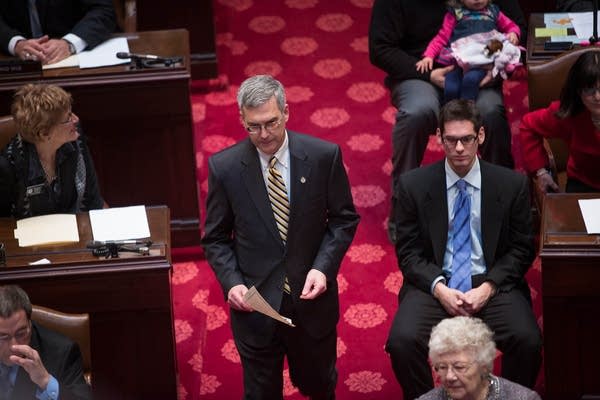DFL priorities include higher minimum wage, education and jobs
Go Deeper.
Create an account or log in to save stories.
Like this?
Thanks for liking this story! We have added it to a list of your favorite stories.

The new DFL majorities in the Minnesota House and Senate have begun introducing bills they say are aimed at improving health care, education and the state's minimum wage.
But three days into the 2013 Legislative session, it's still not clear which tax proposals Democrats might embrace this year, and which might fall by the wayside.
Fast-approaching deadlines in the new federal health care law require early action by the House and Senate on legislation establishing Minnesota's online health insurance exchange. The exchange bill was the only measure among the first five bills introduced in both chambers.
While DFL leaders stress that the budget will be their top priority this session, Senate Majority Leader Tom Bakk highlighted other efforts to fund all-day kindergarten, increase the minimum wage and set a higher threshold for putting constitutional amendments on the ballot.
Turn Up Your Support
MPR News helps you turn down the noise and build shared understanding. Turn up your support for this public resource and keep trusted journalism accessible to all.
"We think these four bills are important to Minnesotans," said Bakk, DFL-Cook. "We think that they'll have a positive impact on citizens all across out state. That's why we're giving them the priority that we are."
Bakk's amendment bill would require a 60 percent majority vote in both chambers of the Legislature to place a proposed change in the constitution on the statewide ballot. The all-day kindergarten measure would provide more money to schools.
State Sen. Chris Eaton, DFL-Brooklyn Center, is sponsoring legislation to increase the minimum wage for large employers by $1.35 an hour to $7.50 an hour, and provide for automatic inflationary increases in the future. "Putting more money in the pockets of minimum wage earners is good for the whole economy," Eaton said. "The money is going to be spent in local businesses, on job training courses and covering rent."

Senate Democrats did not highlight any tax bills among their priorities. But the first-day introductions did include several DFL-backed tax measures, including an expansion of the state sales tax to clothing. Bakk acknowledged the proposals, but did not embrace them.
"Members are going to introduce bills, and what they'll have to do is figure out how they get 34 votes for them," he said. "I suspect some of the things that were introduced today probably are never going to make it to the Senate floor because they're not going to have adequate support."
Bakk said he expects to pass a tax bill this session that includes the income tax increase that Gov. Mark Dayton favors for the wealthiest Minnesotans. Dayton, a Democrat, will unveil his tax proposal later this month.
Senate Minority Leader David Hann said Republicans still won't support tax increases.
"We think raising tax rates is an impediment to growth in the economy," said Hann, R-Eden Prairie. "How do you get growth in the economy when you take more money out of the private sector? That doesn't make sense to me. It doesn't make sense to our caucus."
In the Minnesota House, DFL leaders used their first bills to highlight different priorities. The first measure delivers a key ingredient of previous budget deals: delayed payments to schools. House Speaker Paul Thissen said that "school payment shift" was a big issue in last year's campaign.
"It's a hole that the previous Legislature dug for us," said Thissen, DFL-Minneapolis. "Another commitment we have is to have an honest budget where everything is paid for, and to me, to accomplish that, one of the things we need to do is get the school shift paid back."
House Democrats are proposing new investments in the economic development program known as the Minnesota Investment Fund and in the Minnesota Trade Office as a way to create jobs. There's also a bill providing property tax refunds to homeowners. But other tax proposals have yet to take shape. State Rep. Ann Lenczewski, chair of the House tax committee, said she expects a wide-ranging debate this session. But she said she doesn't know what lies ahead for taxes.
"I'd say it's harder to see than foggy for me at this time, and certainly the tax committee hasn't even met yet," said Lenczewski, DFL-Bloomington. "We've got a broad diversity in both caucuses. So, I'm really going to try to hear what everybody wants to do and be open-minded."
The House also is expected to consider an increase in the minimum wage. Thissen said a recently-formed select committee on living wage jobs will take up the issue this session.
Dear reader,
Your voice matters. And we want to hear it.
Will you help shape the future of Minnesota Public Radio by taking our short Listener Survey?
It only takes a few minutes, and your input helps us serve you better—whether it’s news, culture, or the conversations that matter most to Minnesotans.




